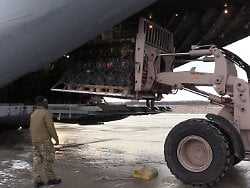Russian troop deployment
FDP chairman considers arms delivery to Ukraine
01/20/2022, 09:50 am
The Ukraine crisis could still cause some resentment in the coalition. In contrast to the SPD and the Greens, the voices in the FDP that no longer rule out arms deliveries to Kiev are increasing. “There must be no taboos,” demands the FDP chairman in the defense committee.
In the coalition, the differences over Ukraine’s desire for German weapons to be delivered to the conflict region are intensifying. In the “Augsburger Allgemeine”, the FDP chairman in the Defense Committee, Alexander Müller, criticized the negative attitude in large parts of the federal government and called for a discussion in the Federal Security Council. “We shouldn’t rule out anything in advance, as far as the supply of equipment and weapons is concerned, but also with regard to Nord Stream 2,” said Müller.
“There must be no taboos,” emphasized the FDP politician. “It doesn’t make sense to restrict our options for action now.” Therefore, the Federal Security Council must now deal with “possible measures and consequences,” demanded Müller. “Close coordination within the EU and NATO is also essential in order to find a common line in dealing with the Russian threats against Ukraine and to act together on this basis.”
“Ukraine is a sovereign country and all states, including Russia, have submitted to international law and thus to the ban on violence,” emphasized the FDP politician. “Russia must respect the common values of the international community, then we are also willing to talk and are open to a dialogue on an equal footing,” added Müller.
“Possibility to support Ukraine”
The FDP defense politician Marie-Agnes Strack-Zimmermann had previously been open to arms deliveries to Ukraine: “The delivery of defensive arms could be a way of supporting Ukraine,” she told T-online. In the event of a Russian attack on Ukraine, Strack-Zimmermann assumes that the Nord Stream 2 pipeline project will also be stopped.
“We agreed in our coalition agreement that no weapons should be delivered to crisis areas,” said the FDP politician, but added: “In view of the current situation and the impact on our continent, we should reconsider this in a specific case.” FDP faction deputy Alexander Graf Lambsdorff, on the other hand, clearly rejected arms deliveries: “The War Weapons Control Act and the Foreign Trade Ordinance prohibit the delivery of arms to areas of tension, crisis areas, war zones.” However, he spoke out in favor of military equipment assistance. He mentioned “non-kinetic equipment” such as protective vests, helmets, radar or night vision devices.
Chancellor Olaf Scholz only ruled out arms deliveries to Kiev on Tuesday: “The German federal government has been pursuing a similar strategy on this issue for many years. And that also means that we don’t export lethal weapons,” said the SPD politician. The new government is sticking to that. Foreign Minister Annalena Baerbock also rejected the demand for arms deliveries during her visit to Ukraine.
SPD expert: “Everything must be on the table”
The Eastern Europe expert in the SPD parliamentary group, Josip Juratovic, also ruled out arms deliveries to Ukraine. “It is now a matter of quickly finding a reasonable dialogue and offering Russia a hand,” he emphasized. “First of all, it should be about integrating Russia into the future European security order, not about threatening gestures or sanctions. And certainly not about arms deals with Ukraine.”
However, Juratovic welcomed the fact that the German government would no longer rule out sanctions against the Nord Stream 2 gas pipeline in the Baltic Sea in the event of an attack on Ukraine. “We cannot accept a redrawing of the borders in Europe by Russia,” the SPD politician told the newspaper. “That’s why everything has to be on the table, we can’t ignore any topics, not even the Swift payment system and the Nord Stream 2 pipeline.”
Because of the massive Russian troop deployment on the border with Ukraine, the West fears that Russia is preparing to invade the neighboring country. Russia is demanding security guarantees from NATO, including a waiver of further eastward expansion. The western alliance rejects this.
The Federal Security Council is responsible, among other things, for approving arms exports. The committee meets in secret under the leadership of the chancellor. The permanent members of the Federal Security Council are the defense minister, the foreign minister, the interior minister, the heads of finance, economics and justice, as well as the development minister and the head of the Federal Chancellery.
